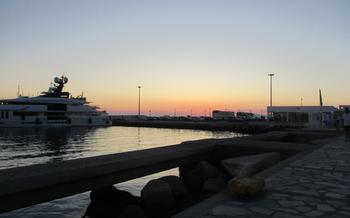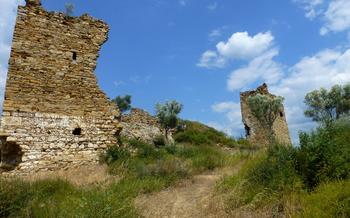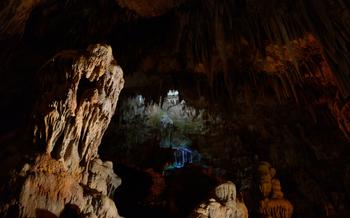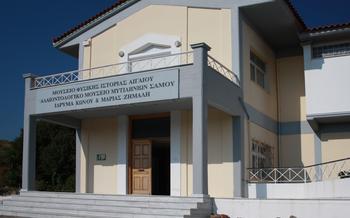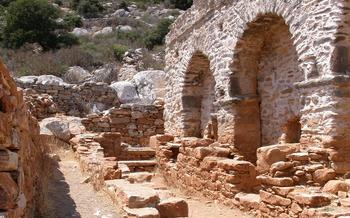
The Natural History Museum of Alexandroupolis
- The Natural History Museum of Alexandroupolis: Where Nature's Wonders Come Alive
- History and Significance: A Journey Through Time
- Exhibits and Collections
- Geological Wonders
- Biodiversity Showcase
- Marine Life Displays
- Fossil Treasures
- Hands-On Experiences
- Educational Programs
- Research and Conservation
- Temporary Exhibitions
- Accessibility and Facilities
- Location and Transportation
- Admission and Hours
- Tips for Visitors
- Insider Tip:
The Natural History Museum of Alexandroupolis: Where Nature's Wonders Come Alive
History and Significance: A Journey Through Time
Nestled in the heart of Alexandroupolis, the Natural History Museum stands as a testament to the region's rich natural heritage. Founded in 1978, the museum embarked on a mission to educate and inspire visitors through its captivating exhibitions and interactive displays. Its strategic location in Alexandroupolis, a city renowned for its natural beauty and diverse ecosystems, makes it an ideal hub for exploring the wonders of the region's flora and fauna. Step inside and prepare to be immersed in a world where nature's secrets unfold, igniting a sense of wonder and appreciation for the delicate balance of life.
Exhibits and Collections
The Natural History Museum of Alexandroupolis offers a diverse range of exhibits that delve into the rich natural heritage of the region. Visitors can explore the Hall of Geology, which showcases the area's unique geological formations and features. The Hall of Biodiversity highlights the local flora and fauna, showcasing the region's diverse ecosystems and the importance of their conservation. The Hall of Marine Life immerses visitors in the wonders of the nearby Aegean Sea, featuring exhibits on marine life, ecosystems, and the significance of marine conservation.
The museum also features a collection of fossils, providing a glimpse into the region's prehistoric past. Visitors can marvel at the remains of ancient creatures, including fossilized bones, shells, and imprints. Notable artifacts include a complete skeleton of a prehistoric elephant, a fossilized whale skull, and a collection of marine fossils that showcase the evolution of life in the Aegean Sea.
In addition to its permanent exhibits, the museum also hosts rotating and temporary exhibitions that explore various aspects of natural history. These exhibitions often feature the work of local scientists, artists, and conservationists, providing visitors with new perspectives on the natural world.
Geological Wonders
Delve into the fascinating realm of regional geology at the Natural History Museum of Alexandroupolis. Explore captivating displays that showcase the unique geological features of the area. Learn about the intricate processes that have shaped the landscape over millions of years, from towering mountain ranges to mesmerizing coastal formations. Discover interactive exhibits and models that bring complex geological concepts to life, providing an immersive and educational experience.
Biodiversity Showcase
The Natural History Museum of Alexandroupolis proudly showcases the incredible biodiversity of the region through its extensive collection of local flora and fauna. Visitors can marvel at the stunning array of plant and animal species that thrive in this diverse ecosystem. Interactive displays and informative panels provide insights into the importance of preserving the region's unique biodiversity and the threats it faces.
Among the highlights of the biodiversity section are exhibits showcasing the region's rich birdlife, including species such as the majestic white-tailed eagle and the colorful bee-eater. Visitors can also learn about the diverse marine life found in the nearby Aegean Sea, with exhibits featuring a variety of fish, mollusks, and crustaceans. The museum also houses a collection of reptiles and amphibians, including the endemic Balkan green lizard and the rare fire salamander.
Through these exhibits, the museum aims to raise awareness about the importance of conserving the region's natural heritage and promoting sustainable practices to protect the delicate balance of its ecosystems.
Marine Life Displays
The Natural History Museum of Alexandroupolis offers a captivating dive into the wonders of marine life, showcasing the rich biodiversity of the neighboring Aegean Sea. This section of the museum is a testament to the region's exceptional marine ecosystems, featuring immersive displays that allow visitors to explore the depths of the sea without getting wet.
From intricate coral reefs to vibrant seagrass meadows, the museum's exhibits showcase the diverse habitats that thrive in the Aegean Sea. Visitors can marvel at the colorful array of fish species, from tiny damselfish to majestic groupers, as they dart through the tanks, replicating their natural environment.
Interactive exhibits and touch tanks provide hands-on experiences, allowing visitors to get up close and personal with some of the sea's gentlest creatures, such as sea stars and sea urchins. These interactive displays not only educate but also foster a sense of awe and respect for the delicate balance of marine ecosystems.
The museum's marine life section highlights the importance of preserving the Aegean Sea's fragile ecosystems, emphasizing the impact of human activities on marine biodiversity. Educational panels and displays raise awareness about the threats facing marine life, such as pollution, overfishing, and climate change, inspiring visitors to become stewards of the ocean.
Fossil Treasures
Delve into the captivating realm of paleontology at the Natural History Museum of Alexandroupolis, where a treasure trove of fossils awaits your exploration. Embark on a journey through time as you encounter the preserved remains of ancient creatures that once roamed the region. Among the highlights is an impressive collection of ammonite fossils, showcasing the diversity of these marine invertebrates that flourished millions of years ago. Discover the fascinating fossil footprints left behind by prehistoric animals, providing a glimpse into their behavior and habitats.
The museum also boasts a remarkable collection of dinosaur fossils, including teeth, bones, and even fossilized eggs. These relics offer valuable insights into the lives and evolution of these majestic creatures that ruled the Earth long before humans. Interactive displays and educational exhibits enhance the experience, allowing visitors to engage with paleontology in a hands-on and informative manner.
Hands-On Experiences
The Natural History Museum of Alexandroupolis offers an array of interactive exhibits and hands-on activities that cater to visitors of all ages, particularly children. These experiences not only enhance the museum's educational value but also make learning about natural history fun and engaging.
Interactive displays allow visitors to explore geological formations, examine plant and animal specimens, and even touch marine creatures. Interactive touch screens provide in-depth information about the exhibits, making them accessible to people of all backgrounds and interests.
The museum's educational programs and workshops are designed to foster a deeper understanding of natural history and conservation. These programs may include guided tours, storytelling sessions, and hands-on experiments that bring the exhibits to life.
For younger visitors, the museum offers a dedicated children's area with interactive games, puzzles, and activities tailored to their learning and development needs. This space encourages children to explore their curiosity and discover the wonders of the natural world through play and exploration.
Educational Programs
The Natural History Museum of Alexandroupolis offers a robust array of educational programs, workshops, and lectures throughout the year. These programs are designed to engage and educate visitors of all ages, fostering a deeper understanding of the natural world. The museum collaborates with local schools to provide guided tours and hands-on activities, promoting scientific curiosity among young minds. Guided tours led by experienced educators are available for groups, offering a personalized and interactive exploration of the museum's exhibits. The museum also hosts regular lectures and workshops conducted by renowned scientists, researchers, and naturalists, providing visitors with insights into the latest advancements in various fields of natural history. These educational programs not only enhance the museum experience but also contribute to the broader mission of promoting scientific literacy and environmental conservation.
Research and Conservation
The Natural History Museum of Alexandroupolis actively engages in scientific research and conservation efforts, contributing to the understanding and preservation of the region's natural heritage. The museum collaborates with universities, research institutions, and environmental organizations to conduct research projects on various aspects of natural history, including biodiversity assessment, ecological studies, and paleontological investigations. These projects not only advance scientific knowledge but also provide valuable data for conservation initiatives.
The museum also plays a crucial role in raising awareness about environmental issues and promoting conservation practices. Through educational programs, workshops, and outreach activities, the museum educates the public about the importance of protecting the natural environment and conserving biodiversity. Visitors can learn about threatened and endangered species, the impact of human activities on ecosystems, and the role they can play in promoting sustainability.
Furthermore, the museum actively participates in conservation initiatives and collaborates with local communities to implement conservation projects. These projects may include habitat restoration, species monitoring, and community-based conservation initiatives. By engaging in research and conservation efforts, the Natural History Museum of Alexandroupolis contributes to the preservation of the region's rich natural heritage for future generations.
Temporary Exhibitions
The Natural History Museum of Alexandroupolis is committed to providing a dynamic and engaging experience for its visitors. To this end, the museum regularly hosts temporary exhibitions that showcase a wide range of topics related to natural history and the environment. These exhibitions often feature unique artifacts, interactive displays, and hands-on activities, making them a great way to learn about different aspects of the natural world.
Past notable exhibitions have included "The Wonders of the Deep Sea," which featured a collection of deep-sea creatures from the Aegean Sea, and "The Secret Life of Trees," which explored the fascinating world of tree biology and ecology. Upcoming exhibitions include "Climate Change and Its Impact on Biodiversity" and "The Amazing World of Insects." These exhibitions are designed to educate and inspire visitors of all ages, and they offer a fresh perspective on the natural world.
Accessibility and Facilities
The Natural History Museum of Alexandroupolis is committed to providing an accessible and inclusive environment for all visitors. The museum is wheelchair accessible, with ramps and elevators available to navigate the different floors. For visitors with visual impairments, audio guides and descriptive signage are offered to enhance their experience. Additionally, the museum offers touch tanks and interactive exhibits designed to engage visitors of all abilities. A gift shop and cafeteria are available within the museum, providing refreshments and souvenirs. The museum also provides special services and accommodations for visitors with disabilities, ensuring a comfortable and enjoyable visit for everyone.
Location and Transportation
The Natural History Museum of Alexandroupolis enjoys an accessible location in the heart of the city, inviting visitors to delve into the wonders of the natural history of the region. Situated on 7 Alexandroupolis-Feres Road, it is conveniently positioned within walking distance from the city center and its vibrant attractions. Public transportation offers a seamless journey to the museum, with buses making frequent stops nearby. For those arriving by car, ample parking facilities are available in the vicinity, ensuring a hassle-free visit.
The museum's proximity to other notable landmarks in Alexandroupolis presents an opportunity to explore the city's cultural and historical tapestry. Visitors can easily extend their journey to discover the rich heritage of the city, from the iconic Lighthouse and the impressive Clock Tower to the intriguing Archaeological Museum. Whether arriving by foot, public transport, or personal vehicle, the Natural History Museum of Alexandroupolis stands ready to transport visitors to a world of awe and wonder, just a stone's throw away from the city's vibrant heart.
Admission and Hours
Admission to the Natural History Museum of Alexandroupolis is free of charge, making it an accessible and enjoyable experience for visitors of all backgrounds. The museum's hours of operation are generally from 9:00 AM to 5:00 PM, Tuesday through Sunday, allowing ample time to explore its exhibits and learn about the region's natural history. However, it's always advisable to check the museum's website or contact them directly for any seasonal variations or special events that may affect their operating hours.
Additionally, the museum offers discounted rates or special admission fees for certain groups, such as students, seniors, or families. These discounts are intended to make the museum's offerings more accessible to a wider audience and encourage lifelong learning.
Tips for Visitors
Visiting the Natural History Museum of Alexandroupolis during the off-season (November to March) offers a quieter and more intimate experience with the exhibits. This period also coincides with the annual bird migration, making it an excellent time to explore the nearby wetlands and spot various species.
To make the most of your visit, consider combining it with other attractions in the area. The city of Alexandroupolis itself offers a charming waterfront promenade, historical sites, and a vibrant culinary scene. Just a short drive away, you can visit the scenic Evros Delta National Park, home to diverse wildlife and stunning landscapes.
Before your visit, check the museum's website or social media pages for information on any upcoming special events or programs. These events often feature guest speakers, workshops, or family-friendly activities that can enhance your museum experience.
Insider Tip:
For a truly immersive experience, plan your visit to coincide with one of the museum's special events or workshops. These events often feature guest speakers, hands-on activities, and behind-the-scenes tours, offering a unique opportunity to learn more about the museum's collections and the work of its researchers. Check the museum's website or social media pages for upcoming events and programs.


